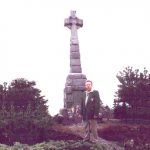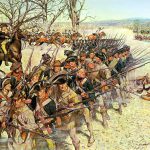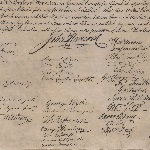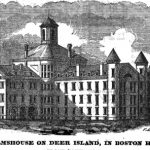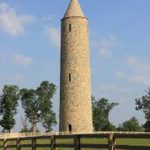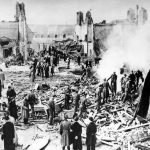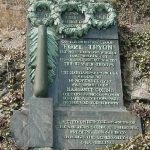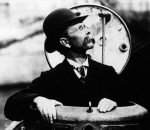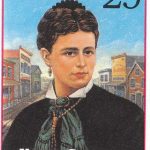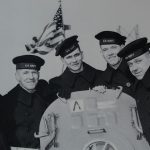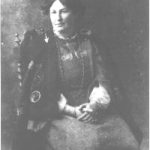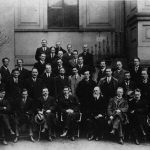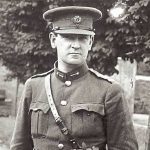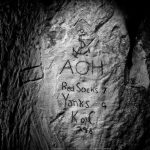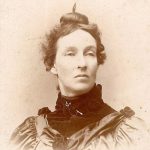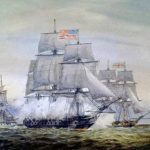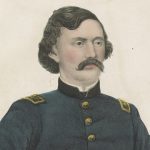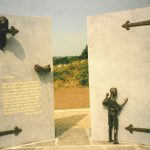Ten years ago, on the 15th of August, 2009, members of the AOH gathered on Grosse Ile in the St. Lawrence River just off Quebec to commemorate a centennial. The American AOHs of U.S. and Canada had erected a 50-foot Celtic Cross in sensitive recognition of the thousands of Irish who sleep there in mass graves after fleeing the Great Hunger in Ireland. It was dedicated on the Feast of the Assumption, August 15, 1909 and here we were again, 100 years later, with the late Marianna Gallagher – grand-daughter of the AOH committee chairman who erected the cross – to commemorate the Centennial … [Read more...] about GROSSE ILE REMEMBERED
The Irish Contribution to America’s Independence
DID YOU KNOW that when America was born, the Irish were there? The Irish, both Protestant, and Catholic, were a major part of Washington’s volunteers from foot soldiers to high ranking officers. When increased Crown exploitation drove the colonists to protest, among the loudest were the Irish who had no great love for the Crown, to begin with. And there were many Irish in America’s colonies. Among them were those who fought the English theft of their Irish lands and ended up hunted men; they were followed by those Catholics and Presbyterians who fled persecution by the Church of England. Some … [Read more...] about The Irish Contribution to America’s Independence
IRISH SIGNERS OF THE DECLARATION OF INDEPENDENCE
On 4 July 1776, the Philadelphia State House was packed, despite a sweltering heat, as Secretary Charles Thomson of Derry read a Declaration that Adams, Jefferson, Franklin and Livingston had composed and that he, Thomson, had drafted. It was a declaration explaining why their revolutionary action was justified. After a full day of debate, modifying copy and amendments, Secretary Thomson recorded the changes and America's Declaration of Independence was complete! The formal copy would not be ready for signature until August, but the public first heard that document read on 8 July 1776 by Col. … [Read more...] about IRISH SIGNERS OF THE DECLARATION OF INDEPENDENCE
DEER ISLAND
In 1847, a crisis hit Boston as ‘coffin ships’ unloaded hordes of Irish exiles fleeing ‘An Gorta Mor’ – Ireland’s Great Hunger. It was no surprise that many were sick after the 6-to-8-week Atlantic crossing. With men and women packed into steerage so tightly, there was no way to preserve privacy or modesty. One report related: “I have known cases of females who had to sit up all night upon their boxes in steerage, because they could not think of going into a bed with a strange man.” Disease spread rapidly and lethally. About 25,000 arrived in ‘Black ‘47’ with many suffering from typhus, … [Read more...] about DEER ISLAND
IRISH ROUND TOWERS
The ancient Round Towers that dot the Irish landscape were erected by Irish Christian monks and can also be found in areas where they served like the two that stand in Scotland and one on the Isle of Man. However, in Ireland where they originated, about 120 are thought to have existed. Today most are in ruins, but 18 to 20 still stand in almost perfect condition. The history and purpose of the Towers are widely debated. Some believe that they were Bell Towers to call the faithful to prayer since they were mostly found near churches and monasteries. Some say they could have served as lookout … [Read more...] about IRISH ROUND TOWERS
DUBLIN BOMBED
The city of Dublin is no stranger to bombs, from the British assault in 1916 to the removal of Lord Nelson’s statue in 1966 on the 50th anniversary of the Easter Rising. Yet one that has largely been forgotten occurred 78 years ago in 1941 during WWII, referred to as ‘the Emergency’ in Ireland. The story began in April when German air raids bombed Belfast. The Belfast Blitz consisted of four German air raids on strategic targets in the city of Belfast causing high casualties. The first was on the night of 7–8 April 1941, a small attack which probably took place only to test Belfast's defenses … [Read more...] about DUBLIN BOMBED
Irish American Heritage Month: Margaret Corbin, “Captain Molly”
Captain Molly was born Margaret Cochran on 12 November 1751 on the western Pennsylvania frontier to Irish immigrant Robert Cochran and his wife Sarah. When Margaret was five, her father was killed in an Indian raid and her mother was kidnapped. Margaret and her brother escaped and went to live with their uncle. At 21, she married a local farmer, John Corbin. When America’s Revolution began, John enlisted in the regiment that General ‘Light Horse’ Harry Lee called the Line of Ireland. Margaret accompanied him, joining other women in cooking, washing and caring for the wounded. Her forceful … [Read more...] about Irish American Heritage Month: Margaret Corbin, “Captain Molly”
Irish American Heritage Month: John Philip Holland, Inventor of the Modern Submarine
Did you know that an Irishman invented the first modern submarine? His name was John Philip Holland and he was born in Liscannor, Co. Clare, Ireland, on February 24, 1841. He experienced the Irish potato failure suffering poor eyesight as a result. His father was a member of the Coast Guards, and young John inherited a love of the sea. Although his poor eyesight prevented him from following in his father’s footsteps, he developed an interest in ship design. John attended the Christian Brothers School where he came under the influence of Brother Dominic Burke, a science teacher, who encouraged … [Read more...] about Irish American Heritage Month: John Philip Holland, Inventor of the Modern Submarine
An Irish American Angel in America’s West
There were many Irish women among the settlers of the American West, and one of the best known in her time was a lady from County Cork named Ellen Cashman. Ellen came to America, like so many others, fleeing the effects of the Great Hunger. She arrived in Boston in 1850 with her mother, Fanny, at the tender age of five where she grew up caring for a younger sister. An ambitious young lady, she worked as a bellhop in a well-known Boston hotel when she decided to follow the call of the American West with the idea of making her fortune. She moved to San Francisco and soon found … [Read more...] about An Irish American Angel in America’s West
Irish American Heritage Month: The Irish Whales
Did you know that the first Gold Medal winner in modern Olympic history was the son of Irish immigrant parents and that Irish athletes dominated Olympic track and field events for the U.S. for the first two decades of the 20th century? The first to win was James Connolly, and he was born on October 28, 1868, in an impoverished section of South Boston. He grew up with a love of sports and when an International Olympic Committee resurrected the ancient Olympic Games to be held in Athens in April 1896, Connolly requested a leave of absence from Harvard to participate and left for Greece. After … [Read more...] about Irish American Heritage Month: The Irish Whales
Irish American Heritage Month: The Sullivan Brothers
DID YOU KNOW that in the annals of America's heroes, there is scarcely a brighter entry than that of the fighting Sullivan brothers? Born in Waterloo, Iowa to Railroad conductor Tom Sullivan and his wife Alleta, George, Francis, Albert, Joseph, and Madison grew up the best of friends in the closeness of an Irish family and matured into patriotic Americans. It was no surprise, therefore, that when Pearl Harbor was attacked, the Sullivan brothers headed straight for the nearest U.S. Navy recruiting office. Navy policy discouraged family members from serving together, but the Sullivans … [Read more...] about Irish American Heritage Month: The Sullivan Brothers
CHARLOTTE GRACE O’BRIEN
Charlotte Grace O’Brien was born 23 November 1845 in Cahirmoyle, County Limerick. Her father, William Smith O’Brien, took part in the aborted rising of 1848 for which he was exiled to Tasmania when Charlotte was 9-years old. Charlotte’s mother died when she was 16 and the 19-year-old Charlotte went to live with her brother, Edward and his wife, Mary. Following Mary’s death in 1868, Charlotte remained with Edward to raise his three children, then aged 4, 3 and 2-years old. In 1870 she found her voice as a writer. Her first book was Dominick’s Trials: An Irish Story, but her 1878 novel about the … [Read more...] about CHARLOTTE GRACE O’BRIEN
SPERANZA
Jane Frances Agnes Elgee was born in Dublin at about 1821 and grew up in a deeply conservative family. She was a gifted linguist and published several translations of French and German works which were reprinted in America. Her first volume of poetry also contained translations from several European languages. In 1845, impressed by the size of the funeral of Young Irelander, Thomas Davis, she began to read his poetry in The Nation, an extremely nationalist newspaper published by Davis, Charles Gavan Duffy and John Blake Dillon, which awakened her to Irish nationalism. After Davis’s … [Read more...] about SPERANZA
THE MOST DEFINING MOMENT IN IRISH HISTORY, II
Last month, we presented the circumstances that led up to the most defining moment in Irish history. They included growing nationalism, extending voting privilege to all men over 21 and women over 30 (from 701,475 registered in 1910 to 1,936,673 in 1918) and then, the UK General election on 14 December 1918. In the Irish part of that election, Sinn Fein won 73 of the 105 contested seats to the Irish Parliamentary Party’s 6 and Unionist’s 22. It was the last all-Ireland election; it was also the first to allow women to vote, the first to elect a woman (Countess Markievicz) to the British … [Read more...] about THE MOST DEFINING MOMENT IN IRISH HISTORY, II
THE MOST DEFINING MOMENT IN IRISH HISTORY
As 2018 ends, we recall that a century ago was a time of great change in Ireland. The Irish Parliamentary Party (IPP) goal of Home Rule, an Irish parliament under the Crown, was supported by many before 1916, but Britain’s reaction to the Rising struck them like an Irish Pearl Harbor. The British secretly court-martialed and murdered the leaders who should have been treated as prisoners of war; they unleashed nation-wide Martial Law treating every Irishman as a rebel and Loyalists convinced Lloyd George to break off a piece of Ireland and give it to them. The reaction was predictable – no … [Read more...] about THE MOST DEFINING MOMENT IN IRISH HISTORY
A LEGACY OF WW1
One hundred years ago this month, the War to End All Wars concluded as an armistice was signed at 5 AM on November 11, 1918. Because of the six-hour time difference, in America it was the 11th hour on the 11th day of the 11th month – a remarkable coincidence! And again, the Irish were there. Up until the United States entered World War One on 6 April 1917, there were some Irish-Americans pulling for Germany to overpower Britain; after all, the enemy of my enemy is my friend! However, loyalty to the land that adopted their families came first and foremost and when America entered the war on … [Read more...] about A LEGACY OF WW1
PROTEST ON THE PRAIRIE
In the late 1800s, banks were charging as much as 50% interest on mortgages and Railroad rates were uncontrollably high. As a result, mid-west farmers were experiencing a downward economic spiral. In Kansas, among the frustrated farmers, one voice was heard that would unite them in search of a solution. It came from Mary Elizabeth Lease who raised her voice in defense of her Kansas farming neighbors. Mary Ellen, as she was known, was the sixth child of Irish immigrants, Mary (Cullen) and Joseph Clyens, who had fled Ireland’s Great Hunger. Born in Pennsylvania on 11 September 1850, she … [Read more...] about PROTEST ON THE PRAIRIE
September 13th is Commodore John Barry Day, a National Holiday of the Order
Did you know that the first flag officer and founder of the United States Navy was an Irishman? His name was John Barry and Dr. Benjamin Rush, a signer of the Declaration of Independence, said in his eulogy at Barry's graveside, "He was born in Ireland, but America was the object of his devotion and the theater of his usefulness." Barry was born in Co. Wexford, Ireland in 1745 and grew up with a great love for the sea. As a young man, he emigrated to the Crown colonies in America and by 1760, he was employed in a shipbuilding firm in Philadelphia. In 1766, at the age of … [Read more...] about September 13th is Commodore John Barry Day, a National Holiday of the Order
TO WIN BY LOSING
On 22 September 1864, an Irish-American Civil War officer became a national hero after losing a battle! His name was James A. Mulligan. James was born in Utica, New York, in 1829, to Irish immigrant parents. After his father’s passing, he and his mother moved to Chicago where, at age 27, James was a popular Irish-American lawyer and Democratic politician. At a time when the Irish population of Illinois was more than 87,000, he commanded the respect and allegiance of Chicago’s large Irish community. He joined a local National Guard unit called the Chicago Shield Guards and was … [Read more...] about TO WIN BY LOSING
A DAY TO REMEMBER
August 15 is a special day for Catholics around the world because it is the feast of the Assumption of the Blessed Virgin. It is also special for our AOH cousins in Ireland who march that day to show pride in their heritage on ‘Lady’s Day’ as it’s called. However, on that day in 1995 an historic event also took place in Derry as the American AOH and LAOH joined with the AOH Board of Erin (BOE) to march in that parade. Our National Presidents, Ed Wallace and Kathy Linton led the line of march behind the American and Irish flags alongside Hibernian leaders from Ireland, England, Scotland and … [Read more...] about A DAY TO REMEMBER
